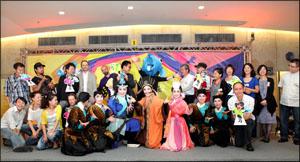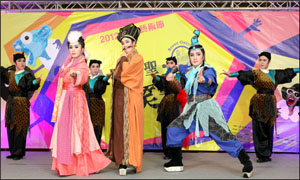Taipei Arts Festival offers a dose of laughter for summer heat
By Psyche Cho Scheduled to run until September 9, the festival plans to stage 12 plays from Switzerland, Germany, Hong Kong, Japan, the U.K., France, Wales, and Taiwan, as well as a free-of-charge exhibition of "Play Bauhaus" from Germany. "Taipei is a great city for comedy because it captures the full vitality of the particular theatre form," noted Keng Yi-wei, Artistic Director of the festival, in a statement prepared for the opening of the event. Thus this year's edition focuses on comedy in various forms and types. "One of the major characteristics of the festival this year is international collaborations—with local groups as the core and international teams in participation," said Keng. At the same time, some of the most highly acclaimed classics worldwide have also been included in the program. A farewell party before death "Les Chaises (The Chairs)", a representative work of the Theatre of the Absurd genre by written by playwright Eugene Ionesco in 1952, will lead the way for other theatric programs in going on stage tonight. Known for depicting solitude and the insignificance of human existence, Ionesco's "The Chairs" is about a party held by an old man and an old woman before they die. As time passes, however, the only things that arrive are imaginary guests and more chairs. Directed by renowned Swiss director Luc Bondy and performed by Theatre Vidy-Lausanne, the play will be staged in the Metropolitan Hall until August 5. The play portrays the illusions a person may conjure up in decrepitude or extreme solitude, which are very realistic and not absurd at all, noted Bondy. His interpretation, which first played in2010, has won wide favorable reviews around the world wherever it has been staged and was even nominated for a Moliere award in 2011. One visible asymmetry on stage will be the ages of the players, who are much more younger than the protagonists are supposed to be. This was purposely set up by Ionesco, said Barbara Suthoff, a representative from the theatre, adding that "it's also in consideration that older actors may not have enough physical strength for the 100-minute play." However, she continued, "the audience will totally forget about the ages of the actors once they are unconsciously immersed into the plots and obtain some insights from the funny plots." International collaborations In the interest of helping local creative talents to grow and vie for more opportunities for exposure on the international stage, several productions this time feature collaborations between local troupes and international talents. Der Goldene Drache (The Golden Dragon), scheduled for August 3 to 5 and August 7 to 11, is such an unprecedented cooperation for Tainaner Ensemble, featuring a director from another country for the first time. The Golden Dragon, written by renowned contemporary playwright Roland Schimmelpfennig, explores identity issues of immigrants in modern German society through five Asian cooks crammed into the small kitchen of a restaurant named Golden Dragon. Unsatisfied with reality and uncertain of their future, these cooks jammed into the kitchen discharge their uneasiness through constant quarreling, yelling, and fierce body movements. Schimmelpfennig examines incidents that happen in the restaurant from varied perspectives. He intriguingly overturns conventional sets by having men's roles played by actresses, women by actors, old by young, and young by old, trying to achieve the aesthetic feelings of poetic, cold, mysterious, and touching. To facilitate cooperation with local actors, director Tilmann Köhler spent a good deal of time learning about the aborigine groups issue in Taiwan, which he considers similar to some of the issues handled in the play. "The play reveals not only current social conditions in Germany but also touches upon the plight everyone faces in a time of globalization—a predicament about individual identity, a sense of estrangement from oneself, intimate partners and the whole society," notes Köhler. Tainanren is a Tainan-based troupe with a 25-year history. Over the decades, it has dedicated itself to experimenting with 'theatricality' through various theater genres from originals to Shakespeare's repertoire. "Breakfast" is definitely the one to see for local art goers who are looking for something innovative. This highly-experimental dance piece combines factors of new writing, on-site band music and videos, mixing everything together to create a special breakfast moment: between night and day. Choreographer Sun Shang-chi tries to break the line bordering reality and dream, delving into the flow of lust in a city through the piece. But it's not a mere dance in a conventional genre, it's more like dance theater. Wielding cameras as they dance, the three performers are dancers and recorders at the same time. Zoom-in shots of the performers and even the audience are projected directly to a huge screen over the stage. This avant-garde live dance film is a pathway leading the audience on a surreal journey, wandering between reality and fiction, truth and lies, emotions and comedy. Sun is a rising star in the circle of dance and has been invited to present his creations in various countries since 2008. He founded the Shang-Chi Sun Company in 2007, a troupe devoted to experimenting with movements and different media to create new perspectives for viewers. "Breakfast" will be staged in the Wellspring Theatre August 10 to 12. Where is Mackie? Adapted from Bertolt Brecht's satirical work "Threepenny Opera", the play is set in an affluent Chinese city-Feng City-where its governor exerts all efforts to cover up the enormous gap between the rich and the poor in welcoming an unknowing emperor. Director Liu Shou-yao employs the perspective of the storyteller to change scenes swiftly and smoothly. Western instruments and popular songs are further adopted to replace traditional gezai opera tunes in the play, showing a rigorous folk charm. Mackie is a mysterious character constantly referred to but unseen throughout the play. As the plot gets more complicated, viewers will be enticed to ask the question, "Where is Mackie?" Other programs included in the festival include Le Theatre du Petit Miroir's "Maui," a household story of Maori people told through a hand-puppet show, from August 10 to 16 in Wen-Shan Theatre; "The Vanishing Horizon" by Idle Motion from the UK, a story about wakening female consciences, from August 17 to 19 in Wen-Shan Theatre, and more. Meanwhile, an exhibition, "Play Bauhaus", presented by the Bauhaus Dessau Foundation, is currently on view in the Songshan Cultural and Creative Park South Tobacco Factory. The display highlights videos of the most important reconstruction and reinterpretation projects inspired by Oskar Schlemmer's dances. It is open every day until September 9 and admission is free. Those who are getting tired of being bombarded by bad news every day and seeking relief, should be sure not to miss the festival programs. Detailed information on the festival is available at http://eng.taipeifestival.org.tw/
Staff Reporter Art can be high-profile enjoyment or a giggling treatment applied to the universal world. The 2012 Taipei Arts Festival, planned under the theme of 'comedy' this year, is a best prescription to relieve summer heat.
Art can be high-profile enjoyment or a giggling treatment applied to the universal world. The 2012 Taipei Arts Festival, planned under the theme of 'comedy' this year, is a best prescription to relieve summer heat.  Have a dreamy breakfast
Have a dreamy breakfast
Back in town, the very Taiwanese-flavored gezai opera "Where is Mackie?" presented by Yi Shin Taiwanese Opera Troupe hits the stage in Dadaocheng Theatre on September 1 and 2.

![Taiwan.gov.tw [ open a new window]](/images/egov.png)
